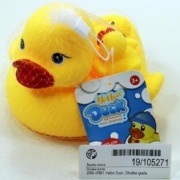What’s the deal with the Plastic Soup again?
March 15 2024 That’s what readers of news site nu.nl on their comment platform Nujij were wondering. In a recent […]
Amsterdam, 28 November 2019 – Sanitary towels, baby diapers, and wet wipes: they are largely made of plastic. These products are thrown away after use and hardly collected for recycling. Their market share is much larger than that of the reusable plastic-free alternative. For the first time, the impact of these products on the environment for Europe has been mapped out.
According to the report written by ReZero, the figures for the European Union are frightening:
49 billion single-use menstrual products (sanitary pads and tampons), equivalent to 590,000 tonnes of waste.
33 billion baby diapers, which is 6,731,000 tons of waste.
68 billion wet wipes, this is about 511,000 tons of waste.
The waste is not only an environmental problem but also production and transport have their impact. Think of the use of water during the production process, the use of energy and raw materials. The report also points to the high costs of waste processing for municipalities.
These products are often flushed down the toilet. Of course, this is not the intention, but it happens. If the sewer is overloaded after heavy rainfall, some of the water is discharged directly into the surface water, including all the waste. For example, the sanitary pads and diapers end up in surface water via the sewer system. These products are among the ten most commonly found items on beaches. On British beaches, they make up for 6.2% of all recorded waste items. If they fall apart in the sea, it is in countless small pieces of plastic that can never be cleaned up again.
Fortunately, there are alternatives widely available. Cotton diapers are washable and therefore reusable. The report calculates that major financial savings are possible, not only in the use of materials, waste and CO2 savings but also, and above all, for one’s own wallet. To give an example: if 20% of women opted for menstrual cups, this would save 100,000 tonnes of waste per year in the European Union and they would be much cheaper.
Illustration: From the cover of the report
March 15 2024 That’s what readers of news site nu.nl on their comment platform Nujij were wondering. In a recent […]
The first Impact Fair is Europe’s largest Impact Experience. An interactive ‘immersive’ experience of impactful examples.
The waste-export to countries outside of the EU has been restricted The Netherlands is against a carpet ban on shipping of plastic waste.
The waste-export to countries outside of the EU has been restricted The Netherlands is against a carpet ban on shipping of plastic waste.

 Cheap plastic toys can be dangerous for children
Cheap plastic toys can be dangerous for children